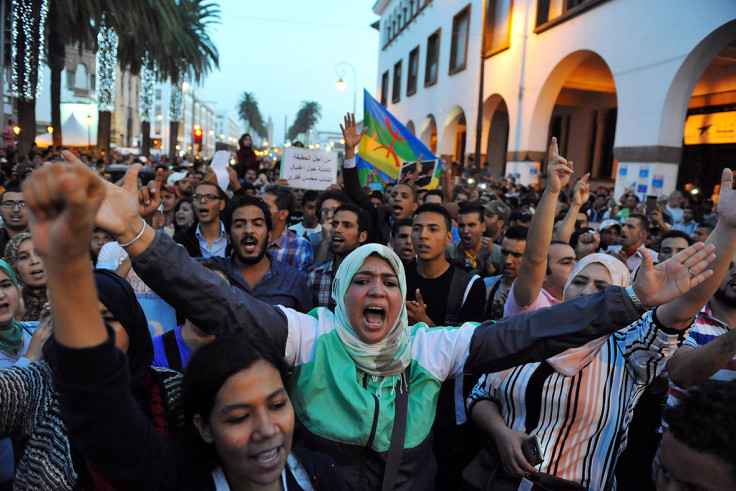Moroccan despotism deserves the same fate as its latest victim, Mohsin Fikri
Fikri was crushed to death in a garbage truck after a dispute with a state official.

"Grind him." These were the two words pronounced by a Moroccan state official who had just confiscated a fish from Mohsin Fikri, an Al-Hoceima fish vendor, and thrown it in a garbage truck. Mohsin desperately climbed into the back of the truck to retrieve his fish. It was at that moment that witnesses report hearing those chilling words.
Mohsin Fikri died almost immediately. All of it was recorded on video and the horrific image of his head peeping from the bottom of the garbage truck press shocked the entire country. Unlike the assassination of five al-Hoceima protestors, thrown into a bank that was deliberately set on fire in 2011, the images of Mohsin could not be refuted by the state.
The image of a human being, dead in a garbage truck, is not a new one in Moroccan popular memory. Only a few years ago, during the climate change-induced floods in the South, we were outraged by pictures of dead Moroccans loaded onto a garbage truck while European tourists were airlifted in helicopters.
Incidents like these make us ask ourselves: do we, as a people, live in dignity? And with the video or the picture of Mohsin in front of us, the inevitable conclusion we come to is: No.
Thus, having answered "no," our outrage, our anger, the build up of everything we have seen in the last few years from the offensive on freedom of expression, to policies of austerity, to police violence — pushes us into the streets again.
The first to react were the residents of Al-Hoceima, it was a swift reaction, as they descended into the streets in large numbers. The protests in Al-Hoceima, in northern Morocco, immediately drew the rest of the country's attention. Protests were subsequently held in 41 cities and towns throughout Morocco. The two words, "grind him" became a hashtag on social media, while on the street it led to a variation of slogans like: "the regime has ground us all up" or "welcome COP22, we grind people here."

The timing couldn't be worse for the Makhzen (the regime), as COP22 (The United Nations Climate Change Conference) will be held in Marrakech in only a few days. With international leaders and civil society pouring into Morocco for the conference, the regime is adamant about maintaining a positive image of a democratic Morocco. The king reacted to the incident by sending the Minister of Interior to visit the victim's family, he also called for a "meticulous" investigation.
But how can the state investigate itself and how can the police, police itself? This is not the first incident where the state, confronted by public outrage, has promised an investigation. We are still waiting for the promised investigation into the murder of Karim Chayeb who was brutally beaten to death by the police in Sefrou, or Mohamed Bouderoua who was thrown out of a building in Safi, or Kamal Amari who was kidnapped then beaten to death in custody, or the five demonstrators set on fire in Al-Hoceima.
Moroccans have become increasingly disillusioned by promises of investigations, and the fact that the official who murdered Mohsin has not been arrested, while three of his friends have, is not a good sign. What will happen next feels predictable, the Moroccan regime has a history of promising investigations to absorb anger, then failing to serve justice when the public's attention moves on. The regime has shown that the constitution written after the 2011 February 20th Movement uprising is merely a set of cosmetic changes designed to get people off the street.
Today the regime acts with more impunity than before, taking advantage of the crises and wars that are happening elsewhere to push forward with politics of hunger— the type of hunger that makes people climb into garbage trucks or the kind of anger that has pushed too many people to set themselves on fire this year.
Thus, it is not just about Mohsin Fikri, it is about the political and socio-economic context that led to his killing. The idea of a "Moroccan exception" or a Moroccan "role model," as Western leaders have put it, is nothing but a facade. For this reason, the solution to the woes of the Moroccan people will not be more reforms, but an entire overhaul of the system.
Nadir Bouhmouch is a filmmaker and photographer based in Marrakech
© Copyright IBTimes 2025. All rights reserved.





















